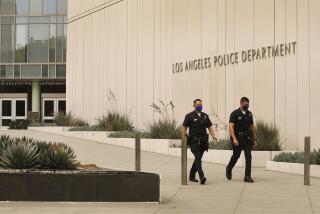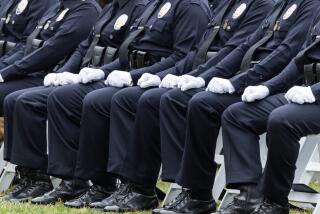Court Refuses to Block Release of Transcripts in Suit Against LAPD
A federal appeals court has denied a request for an emergency order that would have blocked the long-sought release of grand jury transcripts that figure in a lawsuit against a controversial Los Angeles Police Department squad.
The decision by the 9th Circuit Court of Appeals apparently paves the way for disclosure of the transcripts to plaintiffs in a civil rights case brought against the LAPD’s Special Investigation Section over several fatal shootings by its officers.
In December, U.S. District Judge J. Spencer Letts ordered the release of the transcripts to the plaintiffs’ attorney, Stephen Yagman. A frequent adversary in cases involving LAPD policies and practices, Yagman successfully argued that he needed access to the transcripts to determine if SIS officers told the grand jury anything different from their previous testimony in another civil rights case.
“The need for disclosure is greater than the need for continued secrecy,” Judge Letts said in his December ruling, which ordered that Yagman be given the entire transcript of the federal grand jury proceedings.
Attorney Skip Miller, representing Mayor Richard Riordan and other city officials named as defendants in the case, challenged Letts’ ruling and asked that the appeals court issue an extraordinary order blocking the judge’s decision.
But with that request denied, it appears that the transcripts will be handed over under seal to Yagman, who has eight lawsuits pending against SIS.
“The grand jury testimony will presumably now be provided,” Miller said Thursday. “We could go to the U.S. Supreme Court, but that is unlikely.”
The U.S. attorney’s office, which took no formal position on releasing the transcripts, had no comment on the appeals court ruling.
Yagman, meanwhile, called the decision a huge victory for his efforts to prove that SIS officers repeatedly violated the civil rights of individuals in monitoring their activities until they had committed crimes and then engaged the suspects in often fatal shootouts.
Two of Yagman’s cases stem from a June 1995 holdup in Newbury Park in which one robber was killed and another, who is now the lead plaintiff, was seriously wounded. Five other cases stem from a February 1997 Northridge bar robbery and car chase that left three of four occupants in the getaway car dead and one bystander paralyzed, Yagman said.
“The transcripts contain extensive evidence of perjury by the death squad cops that could be used to impeach them in the upcoming trial,” said Yagman, who called the ruling unprecedented.
“I know of no case in which grand jury transcripts have ever been turned over to civil litigants, much less grand jury transcripts of police testimony to plaintiffs in a civil rights case,” he said.
Former federal prosecutor Laurie Levenson, now on the staff at Loyola Law School, said she was aware of other cases where transcripts have been turned over but agreed that the presumed release of transcripts would be quite unusual in its scope.
“I don’t know of any cases where you have had such wholesale release of grand jury transcripts in a case of alleged police misconduct,” Levenson said.
More to Read
Sign up for Essential California
The most important California stories and recommendations in your inbox every morning.
You may occasionally receive promotional content from the Los Angeles Times.










